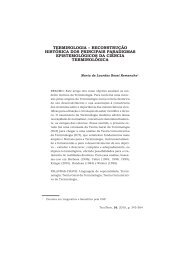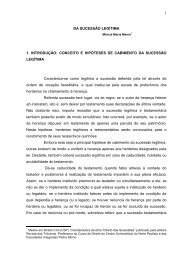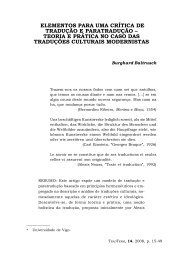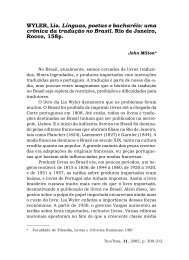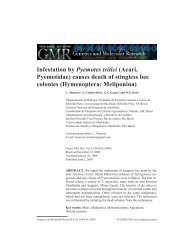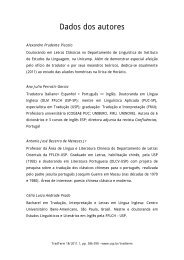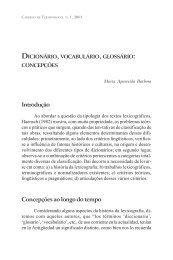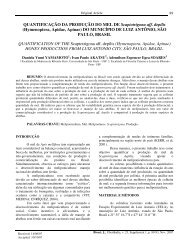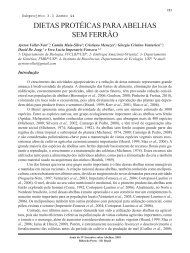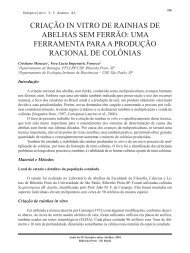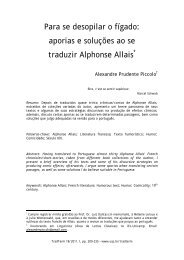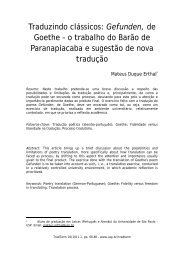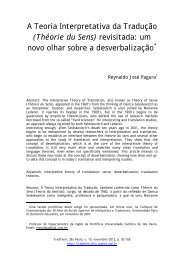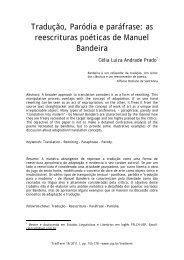Bees as pollinators in Brazil - USP
Bees as pollinators in Brazil - USP
Bees as pollinators in Brazil - USP
You also want an ePaper? Increase the reach of your titles
YUMPU automatically turns print PDFs into web optimized ePapers that Google loves.
B) Honey Bee<br />
Abstract<br />
Poll<strong>in</strong>at<strong>in</strong>g agents, especially <strong>in</strong>sects, are clearly<br />
essential for agricultural production. Honey<br />
bees have become <strong>in</strong>cre<strong>as</strong><strong>in</strong>gly important, <strong>as</strong><br />
field sizes have <strong>in</strong>cre<strong>as</strong>ed and native bees have<br />
decre<strong>as</strong>ed, due to <strong>in</strong>tensive land use and pesticides.<br />
An important advantage of honey bees<br />
is that they can be quickly taken to and<br />
removed from the fields <strong>in</strong> large numbers,<br />
facilitat<strong>in</strong>g the <strong>in</strong>tegration of these <strong>poll<strong>in</strong>ators</strong><br />
<strong>in</strong>to pest management programs. A s<strong>in</strong>gle<br />
truckload can carry 20 million potential <strong>poll<strong>in</strong>ators</strong>.<br />
Honey bees contribute to more than<br />
80% of the agricultural produce poll<strong>in</strong>ated by<br />
<strong>in</strong>sects. Unfortunately, <strong>Brazil</strong> does not have a<br />
strong tradition of us<strong>in</strong>g bees for poll<strong>in</strong>ation,<br />
different from the USA, where more than 2<br />
million colonies are rented annually. Bee -<br />
keep<strong>in</strong>g <strong>in</strong> <strong>Brazil</strong> h<strong>as</strong> grown considerably dur<strong>in</strong>g<br />
the l<strong>as</strong>t few years, especially due to honey<br />
market conditions. <strong>Brazil</strong> now h<strong>as</strong> about 2,5<br />
million colonies available for bee products production<br />
(honey, wax, propolis, pollen, royal<br />
jelly and bee venom) and for poll<strong>in</strong>ation purposes.<br />
There are beekeepers specialized <strong>in</strong> poll<strong>in</strong>ation,<br />
especially for apples, melons and<br />
c<strong>as</strong>hews. All of these products are both consumed<br />
<strong>in</strong> country and exported. To obta<strong>in</strong><br />
export quality fruit, <strong>in</strong>sect poll<strong>in</strong>ation is<br />
absolutely necessary.<br />
Unfortunately, many of the crops that<br />
could benefit from poll<strong>in</strong>ation, are either not<br />
poll<strong>in</strong>ated at all, or are <strong>in</strong>cidentally and haphaz-<br />
Workshop I 63<br />
Participants: David De Jong, Lionel Segui Gonçalves, Farooq Ahmad, Kátia Peres<br />
Gramacho, Ricardo Costa Rodrigues de Camargo, Uma Partap, Valdemar Belchior Filho.<br />
ardly poll<strong>in</strong>ated by wild honey bee colonies or<br />
by apiaries that happen to be nearby, result<strong>in</strong>g<br />
<strong>in</strong> production losses due to <strong>in</strong>efficient poll<strong>in</strong>ation.<br />
Africanized honey bees are seen much<br />
more <strong>as</strong> honey producers than <strong>as</strong> <strong>poll<strong>in</strong>ators</strong>.<br />
For many crops that do not traditionally<br />
use honey bees for poll<strong>in</strong>ation, such <strong>as</strong><br />
oranges, peaches, strawberries, sunflowers<br />
and forage soybeans, we have data <strong>in</strong>dicat<strong>in</strong>g<br />
significant <strong>in</strong>cre<strong>as</strong>es <strong>in</strong> fruit and seed production<br />
and improved fruit quality with poll<strong>in</strong>ation<br />
by Africanized honey bees <strong>in</strong> <strong>Brazil</strong> (Nogueira-<br />
Couto, et al., 1998, Couto 2002). Africanized<br />
honey bees are very active pollen collectors,<br />
mak<strong>in</strong>g them good <strong>poll<strong>in</strong>ators</strong>, and they have<br />
been found to rema<strong>in</strong> on the target crop<br />
longer than do the European honey bees that<br />
are traditionally used for poll<strong>in</strong>ation <strong>in</strong> other<br />
countries (B<strong>as</strong>ualdo, et al,. 2000). Africanized<br />
bees also are more active on the flowers, fly<br />
f<strong>as</strong>ter and are quicker to recruit other hive<br />
mates, than are European bees, mak<strong>in</strong>g them<br />
more active and efficient <strong>poll<strong>in</strong>ators</strong>. Africa -<br />
nized bees forage at lower light levels than do<br />
European bees, so that they work longer days.<br />
They also do not reduce brood production<br />
dur<strong>in</strong>g w<strong>in</strong>ter, so the colonies rema<strong>in</strong> strong,<br />
with abundant foragers for poll<strong>in</strong>ation activities.<br />
It is relatively e<strong>as</strong>y to establish new<br />
colonies by collect<strong>in</strong>g swarms with bait hives,<br />
and Africanized colonies grow quickly, so that<br />
beekeepers can e<strong>as</strong>ily produce the large numbers<br />
of colonies needed for poll<strong>in</strong>ation of<br />
crops. There are well-established migratory



